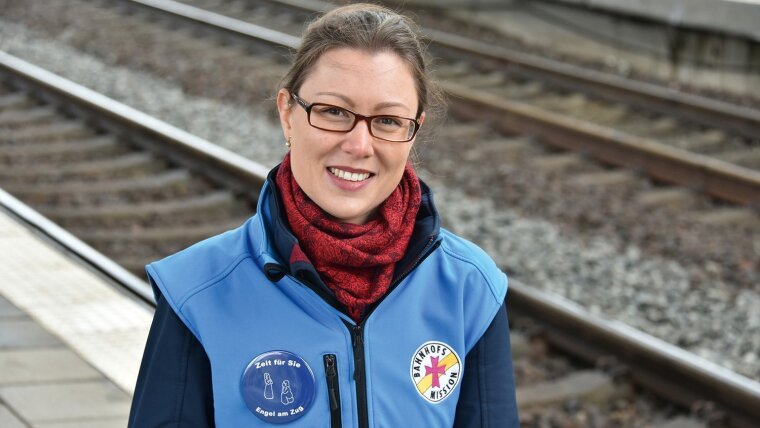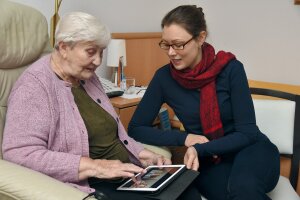
In a place where others arrive and depart—some rushing, some searching, and some stranded— Magdalena Steinhöfel offers guidance and support. The 31-year-old theology doctoral candidate co-founded a charitable initiative at Erfurt Central Station, where she spends almost every minute of her free time as a volunteer.
When you arrange an interview with Magdalena Steinhöfel, it doesn’t take long to find a suitable location. »I’ve already booked a quiet room for our chat,« says the doctoral candidate as we meet for the first time in the library foyer, and she runs off to fetch the key. Organization is part of her everyday
life—especially at Erfurt Central Station, where the theologian from the University of Jena has been spending a lot of time in recent years.
In 2015, she collaborated with like-minded people to found a charitable initiative at the train station. She explains her motives: »As Christians, we want to get involved and do something good for our society— based on our faith, but not to force people into religion«. As a place for meeting and saying goodbye, for moving and stopping, for being next to one another rather than together, a train station is a particularly suitable place for the Christian community to work outside church structures.
During the first two years, they travelled around as the »Engel am Zug«—a german pun which means: »The angels turn at the train«. Now they can be seen wearing the striking vests of the »Bahnhofsmission« initiative. »Our teams are usually at the station twice a week and approachable for everyone,« says Steinhöfel. »We support people with travel issues, provide information, calm people down when something goes wrong, and help senior citizens get on and off the train. But the most important thing is having conversations and taking the time«. After all, many people do not come to the station to travel; they simply want to be around other people. Magdalena Steinhöfel and her colleagues have become an important point of contact for them. While some just stop by to say »hello«, others talk about their everyday problems. »We have more time and therefore more patience for the homeless and people with mental health problems than, say, the station staff or police, who really appreciate our work,« says the 31-year-old.
Appreciation is important to Steinhöfel, because her charity work at the station is very demanding. She is often faced with difficult situations that linger on her mind, such as her encounter with a suicidal man whom she escorted to a psychiatric hospital. This highlights the importance of regular discussions within the group. »And it is very fulfilling and satisfying to know that you are doing something worthwhile«
Magdalena Steinhöfel as a counsellor at a retirement home in Jena
Image: Anne Günther (University of Jena)Magdalena Steinhöfel also visits train stations when she is off duty. She has always enjoyed taking the train—on her travels and in her everyday life. And she has certainly discovered the tracks of Thuringia: She was born in Rudolstadt, grew up in Weimar and went to boarding school in Schulpforte before coming to Jena for her studies in 2008—after volunteering for a year at the Music Academy of Arnstadt-Ilmenau. A teacher had motivated her to study Christianity at university. As her bachelor’s programme was not giving her the desired depth, she decided to take an additional diploma in Protestant Theology. She obtained her bachelor’s degree in 2012 and completed her diploma four years later; her doctoral programme started shortly thereafter. Her doctoral thesis project is also strongly influenced by her Thuringian roots, as she is examining the work of pastors in the largely secularized eastern German states.
The special situation of pastors in East Germany
During her studies, she realized that academic pastoral theologians dealt very rarely with the situation of the Church in eastern Germany. Pastoral theology provides pastors with guidance on how to fulfil their role and practise their profession. »Academic outlines are almost always written from the
perspective of West Germany, where church structures are more firmly anchored in society and each pastor is responsible for far fewer congregations than in East Germany,« explains Steinhöfel. "If the basic academic work does not consider the special situation in the east of the country, however, it will
fail to adequately prepare young pastors for the challenges in their profession, where they are sometimes responsible for 15 congregations at the same time«. She argues that dealing with this situation is not only important in order to do a good job in East Germany, but also to prepare for future developments occurring throughout the country. After all, social and religious transformation processes can be observed in almost all regions of Germany. »It is important that pastors actively and conscientiously work on their job profile and their role in a theological manner to adapt to new developments,« explains the doctoral candidate. »That means, for example, if I want to live here with mostly non-religious people, I have to be prepared to occasionally leave my traditional environments and church structures and create new ones. I have to ask myself: What is available here and what can I contribute from my position?« The charitable initiative at Erfurt Central Station is a
good example of such a contribution.
There is a close link between Magdalena Steinhöfel’s academic work and volunteering, and she speaks clearly and cheerfully about both. She sometimes takes a few moments to consider before answering appropriately and puts conversations on hold if they go too far off topic before referring back to them later on. Exchanging views with other people is important for her to constantly reflect on her thoughts and actions—and she seizes every opportunity to do so. Even her reaction to our interview enquiry sounds more curious than cautious: »Of course! I’ve never done anything like that before, so why not?«
It therefore comes as no surprise that, on the one hand, she would like to continue her work in academia after completing her doctorate, but she would also like to take on a practical role within the Church. »I just need both—theoretical research and direct contact with people«. She found the latter during her recent work as a counsellor for senior citizens in Jena. She has also organized leisure activities for children and worked as a palliative carer. But how can she process the experiences that go hand in hand with such work? »After a hard day’s work, my mental cleansing usually involves me sitting at home and staring at the walls for fifteen minutes as I let everything sink in and think about what’s happened,« explains the theologian. »I also find it helpful to put everything into my prayers with God at the end of the day«.
Switching off and enjoying the moment
At times, switching off can also mean letting go. »I am a very structured person and sometimes go over the top with my planning and preparation. My friends would definitely agree with me there,« admits Steinhöfel. »At the station, I am frequently reminded of how important it is to give up control and enjoy the moment«
She will have more opportunities to do this in the future, as the project at Erfurt Central Station should really get going in two years at the latest. Magdalena Steinhöfel and her »Angels on the Train« have found a room once again, as they are currently planning to build a small pavilion on a platform, so that the charitable initiative can become a permanent point of contact
for those in need of help.
By Sebastian Hollstein
